Photographs: Robert Galbraith/Reuters Bhupesh Bhandari in New Delhi
Over the next few months, people in India will get to use the next generation of Microsoft's mobile phone operating system, the Bing search engine, Windows Live Messenger, an all new Hotmail and probably also a new television game that does not require controls.
This is the first marketing blitzkrieg from the Redmond-based company. Microsoft wants to regain the territory it lost over the years to rivals like Google, Yahoo!, Symbian, Apple, Nintendo and Sony.
And Microsoft is dead serious about it. In 2009, when most companies cut back their research budgets, it spent as much as $9.5 billion on new products, up from $8.1 billion the year before. (Microsoft too faced a tough year: Its total earnings fell 3 per cent to $58.3 billion and operating income fell 9 per cent to $20.3 billion in 2009.)
There are three screens, Microsoft knows, which hold great potential: The mobile phone, personal computer and internet.
Television, the fourth, could come into the picture once Microsoft launches its game some time in the future. Codenamed Project Natal, it will require no controls to play and will track the player's full body movement, and recognise his face and body. It will work on every Xbox 360 console.
...
Can Microsoft regain ground lost to rivals?
Image: Kids play on the Microsoft surface game monitor during the grand opening of Microsoft's first retail store in Scottsdale, Arizona October 22, 2009.Photographs: Joshua Lott/Reuters
The market in India sure is huge.
There are over 600 million mobile phones in use in the country, 36 million personal computers and 50 million internet connections. While the mobile phone space is undoubtedly huge, are the other two really big in a country of 1.1 billion people?
Ranjiv Singh, the chief marketing officer for Microsoft India's consumer and online business, has a different take on it. Internet, says he, is largely an urban play.
As 50 million connections would mean a total internet population of 250 million, it covers a large section of the country's urban population of around 350 million. "By 2013, we will be at 95 million, that will make us the third-largest internet population in the world," says he.
The personal computer numbers are small, and smaller still if you look at those installed at homes (the consumer segment that Microsoft is targeting) - just 11 million. The market for personal computers, feels Singh, is all set to take off.
"Sales grew 30 per cent last quarter. Growth forecasts are between 20 per cent and 30 per cent. Prices have come down, so affordability is no longer an issue. Social networking has increased the relevance of the personal computer," says he.
Growth in fixed-line broadband (50 per cent in the last one year) as well as wireless broadband (200 per cent) and the improvement in the retail environment augur well for the personal computer market. Of course, laptops and netbooks have outpaced desktops in sales.
...
Can Microsoft regain ground lost to rivals?
Image: The new Windows 7 operating system installation DVD is pictured on a notebook.Photographs: Shannon Stapleton/Reuters
Between the three screens - the mobile phone, personal computer and internet - Singh reckons the opportunity for a company like Microsoft could be as high as $10 billion (Rs 45,000 crore).
What seems to have fuelled Microsoft's appetite is the success of Windows 7. In India, it has increased the Windows run rate by six times.
Ninety per cent of the shipments are currently on Windows 7. Much of this success, according to Singh, has come from Microsoft Security Essentials bundled with Windows 7, which detects, blocks and removes viruses, spyware, trojans, bots and other malware.
As many as 44 million Indians use email and 25 million browse the internet everyday. This ecosystem is fraught with malware. Between January and June 2009, 3,286 Indian websites were hacked; over 4,000 Indian portals were defaced in 2008; and between April and December 2008, phishing reported losses of Rs 46.6 crore (Rs 466 million). This has made Indians alive to security solutions.
Microsoft does not disclose its India numbers. Analysts reckon it did business of around $500 million (Rs 2,250 crore) in the country in 2009, of which about a fourth came from the consumer segment.
Globally, Microsoft gets a larger chunk of its revenue from this segment. One reason for its lower contribution in India could be the extent of software piracy in the country.
According to the 6th annual BSA and IDC Global Software Piracy study, illegal shipments accounted for 65 per cent of the software sold in India in 2009 - though 3 percentage points below what it was in 2008, this is way above the global average of 43 per cent.
...
Can Microsoft regain ground lost to rivals?
Image: Microsoft CEO Steve Ballmer takes the stage at the Windows 7's Launch Party in New York.Photographs: Shannon Stapleton/Reuters
Experts believe that in the consumer market Microsoft lost its momentum because many a time its products did not talk to one another and it needed to plug that gap.
This allowed rivals to steal a march over it. Little surprise, a lot of Microsoft's research money has gone into the new offerings.
"We have relooked, retooled and re-engineered what we were doing. The consumer is not satisfied with what is there in the market; he is looking for innovations," says Singh.
"The main idea is to make it simple for the consumer, and delight him. We first looked at the Microsoft silos to see what does the consumer want, and then integrate that into our offerings. We are for the first time being open about what we are integrating. The brand lives with its consumers. So, there is integration of not just Microsoft properties but whatever the consumer wants."
Simplify matters and offer the customer whatever he wants is Microsoft's new mantra.
Smart phone wars
Microsoft CEO Steve Ballmer unveiled the Windows Phone 7 Series, an operating system for smart phones, at the Mobile World Congress 2010 at Barcelona on February 15.
"In a crowded market filled with phones that look the same and do the same things, I challenged the team to deliver a different kind of mobile experience. Windows Phone 7 Series is a phone that truly reflects the speed of people's lives and their need to connect to other people," Ballmer had said.
According to IDC, there are about 2.5 million smart phones in India - a small market. But the numbers could rise exponentially with the launch of 3G (third generation) service by telecommunication companies some time later this year.
Almost 70 per cent of the market is with Symbian. It is followed by Research in Motion (the maker of Blackberry phones), Microsoft's Windows Phone, Apple's iPhone and Google's Android.
...
Can Microsoft regain ground lost to rivals?
Image: A T-Mobile G1 Google phone running Android.Photographs: Mike Blake/Reuters
Analysts expect Android to gain market share in the days to come because of its open nature which allows handset makers to customise the applications.
Google is also known to be working on a new operating system. This market will therefore not be a cakewalk for Microsoft.
"It is a real challenge for Microsoft because there are a variety of other platforms there. Microsoft's Windows Phone doesn't work on Linux. So, there is a huge gap," says Ascentius Consulting Principal Analyst Alok Shende.
Singh, on his part, is confident about Windows Phone 7 series which will be available towards the end of the year.
"Competition in the market will be around differentiation. Microsoft has a very serious proposition here," says he. Thus, 'live tiles' on the screen will show real time content and not static icons.
There will be a dedicated Bing button on the handset for internet search. Friends will be tagged with feed from all social networking sites - Facebook, LinkedIn and so on. Videos and pictures across social sites can be viewed and shared in one step. It will come fitted with Xbox Live games and will have music from Zune.
The challenge for Microsoft will be to sell the operating system to handset makers. Singh says that Microsoft will be selective here.
"One of the things we are doing differently is that we will tie up with manufacturers absolutely committed to delivering the promise. We don't want people to change the way we visualise things, our consumer insights," says he.
"There has to be strict control on how we land the promise to the consumer."
...
Can Microsoft regain ground lost to rivals?
Image: Chief Executive Officer of Microsoft Corporation Steve Ballmer attends a news conference to present the Windows Mobile operating system.Photographs: Charles Platiau/Reuters
Microsoft is learnt to have tied up with some large handset makers, though their names are under wraps. Singh also indicates that in the future Microsoft could launch something similar for lower-end phones as well.
"We can look at the entire market rather than just at the top end. It's no more about voice and SMS alone. You can anticipate what will be the next wave, and then you can come in and play. That is where Microsoft will have some really serious stuff to offer."
Web wisdom
Gartner Principal Research Analyst Diptarup Chakraborti has an interesting take on Microsoft's internet strategy: "This is the first time Microsoft has faced a real threat. Earlier it easily beat Apple, Netscape, AOL and Linux. This time it's not been able to overcome competition from Google as fast as it would have liked to.
At the end of the day, Microsoft is a desktop software company; but with personal computer growth less than anticipated it knows that it has to reinvent to become an Internet player."
On the web, Microsoft has kicked off its new innings with Bing, its new search engine. Google had, over the years, decimated all competition.
Microsoft figured out that there has been an online information explosion in the last few years. The number of websites has increased from 100,000 in 1997 to 200 million in 2009, the number of links has increased from 25 million to one trillion and the content has shot up from 15 terabytes to 5 million terabytes.
...
Can Microsoft regain ground lost to rivals?
Image: Visitors interact with Bing Maps at the Microsoft booth during the 2010 International Consumer Electronics Show in Las Vegas January 7, 2010.Photographs: Mario Anzuoni/Reuters
Yet, research carried out by Microsoft showed, users are dissatisfied. Search results for 50 per cent of the queries failed to meet the consumer's needs (they are either abandoned or refined), and 35 per cent of people expressed dissatisfaction with search today - and this percentage increased when they moved into task-focused activities like finding a product or getting local information.
Twenty-five per cent of the queries resulted in a person ...
Can Microsoft regain ground lost to rivals?
Image: A woman walks in front of a Yahoo! billboard in New York's Time's Square January 25, 2010.Photographs: Brendan McDermid/Reuters
How will Bing take it on?
"People will go for what works for them. Advertising will get you only this much; product usage, loyalty and experience which will get consumers come to Bing again and again," says Singh.
"Search has remained static for ten years. When did you last hear of innovation here? The best form of flattery is imitation. The competition is tracking what we have done."
Microsoft, it is thus safe to assume, will depend on word-of-mouth publicity for Bing.
Meanwhile, rivals will not sit idle and twiddle their thumbs.
"We are going to focus on emerging markets because Yahoo! has a mindshare there. It is a competitive market and we will attract and retain users by keeping them engaged with the Web.
Yahoo! talks about you and caters to individual needs. We will offer an attractive set of products and services to our users that are better than are competitors," says Yahoo! India R&D CEO and vice-president Shouvick Mukherjee.
...
Can Microsoft regain ground lost to rivals?
Image: Blackberry.Live and kicking
Meanwhile, Windows Live Messenger, which was announced on April 30, is aimed at the 38 million active online consumers and the fast-growing tribe of social networkers and users of instant messaging.
Bing is integrated into it, so that users can attach links, images and videos without leaving the conversation window. It has a "social dashboard" with updates from across networks.
It is also integrated with mobile phones using Windows Phone, iPhone and Blackberry. Users can also play around with availability. After office, for instance, they can block the device for messages from office.
But the biggest innovation has been in Hotmail. Research showed that 80 per cent users want email to be more efficient. Many of them said it takes too long to get through their inboxes.
Half of them even said they were missing important messages because of all the clutter in their inbox.
In the new Hotmail, Microsoft has attempted three things to make email more efficient: Help users manage the clutter in the inbox, save time on everyday tasks, and integrate social networks within the inbox.
...
Can Microsoft regain ground lost to rivals?
Image: Hotmail.Thus, the sweep function will help users block email from a sender forever.
Other email (Gmail, Yahoo! and others) will also get displayed on the Hotmail home page. Bing, of course, has been integrated into Hotmail. Special capacity has been created for sharing images.
"There are 1.5 billion photos that are uploaded in the Hotmail environment every month. Through the integration of Skydrive, the user can at one go send up to 200 photos of over 10 gigabytes," says Singh.
"The images you get now are links and not images, which is not a cool experience. In the new Hotmail you will get the pictures as well as the video on your screen. You won't get distracted from what you are doing. This improves efficiency without losing the environment."
The all important question is will it work? Will Microsoft get advertisers on board for the internet-based initiatives?
India, mind you, is a very traditional media market, and digital advertising is not more than 3 per cent of the pie of Rs 18,000 crore (Rs 180 billion).
Experts say it is not easy for companies to build brands online. Microsoft has a large team in place to get advertisers. Can they get the money? Much will depend on what users have to say.
With contributions from Kirtika Suneja & Byravee Iyer



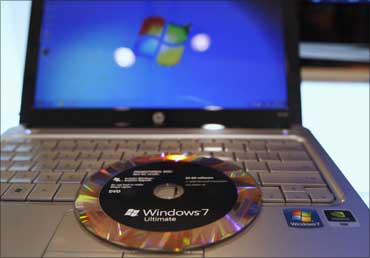
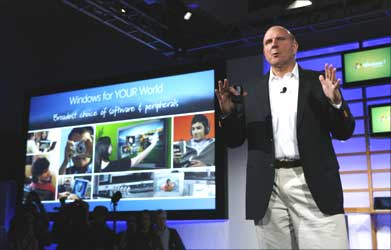

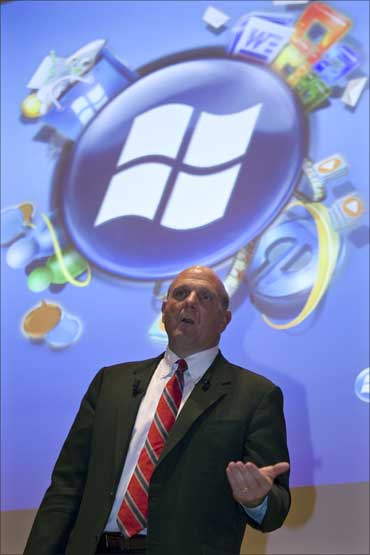

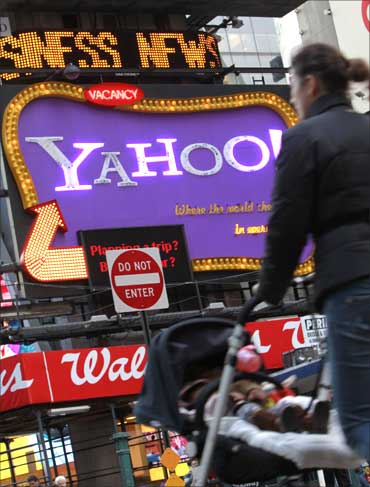
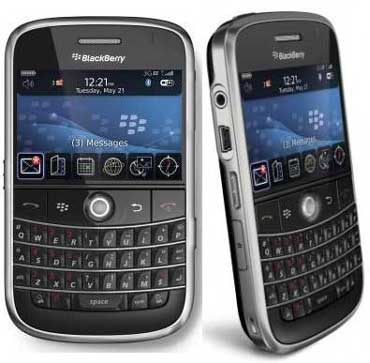
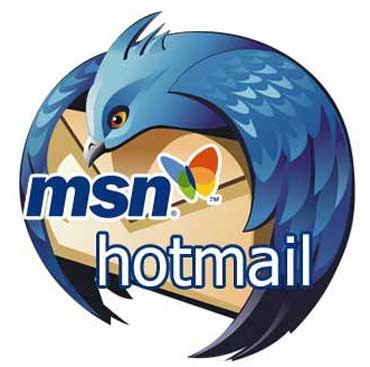

article